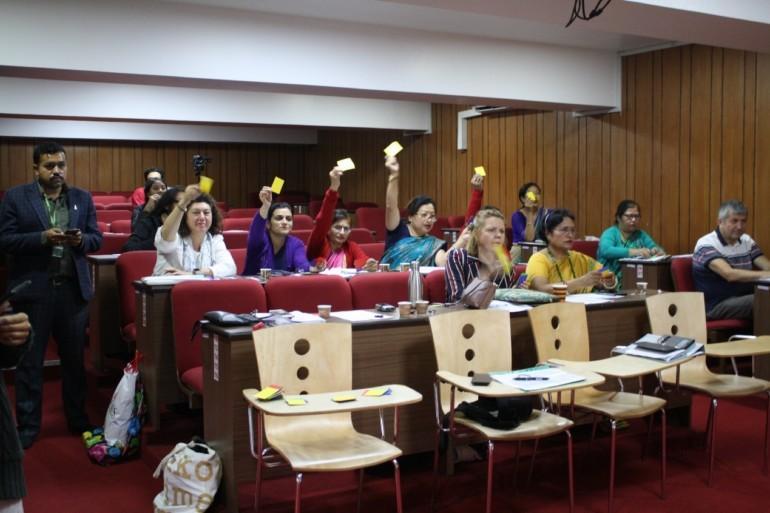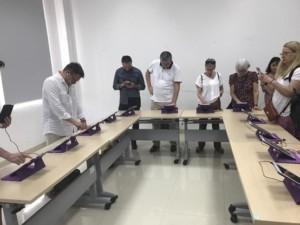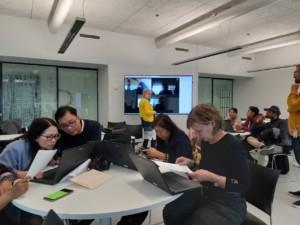Assessing Content and Teaching in Holistic Multi-professional Teaching

As part of the DVINE project´s main activities, pilot courses of DVINE curriculum were held in Vietnam and Nepal in 2021. At the end of the courses, feedback that illuminates strengths and weaknesses of all six study units of the DVINE curriculum was gathered from all students and teachers.
The quality level of five DVINE curriculum study units was investigated using 26 closed-ended questionnaire questions and three open-ended questions. All 26 programme features, seven content-related, 10 teaching- and learning-activities-related, six supportive learning materials, equipment, and environment, and three assessment activity features were found to be strong or very strong.

Strong or Very Strong Programme Features and Achievement Levels
In the DVINE 2021 courses, the significance, learnability, interest, self-sufficiency, validity, utility, and feasibility features of content were found to be strong or very strong.
The contribution of the teaching and learning activities used for “motivation to learn”, “active participation”, “students with learning difficulties”, “independent, students’ own and creative thinking” was found strong or very strong. Other teaching and learning activity features such as “feedback and corrections”, “suitability”, “adequacy”, “effectiveness of in-class discussions, “student centred approach”, and “effectiveness in learning” were regarded as strong or very strong.
The usefulness of the course learning materials for “pre-class preparation”, “strengthening learning”, and “learning effectively” was found strong or very strong. In addition, other supportive learning materials, equipment, and environment features, “effectiveness of the course learning materials in classroom learning”, “suitability of the given time”, and “efficiency of the learning environment” were regarded as strong or very strong.
Assessment activities’ “consistency with learning outcomes”, “contribution to students’ learning processes”, and “appropriateness for students’ readiness and ability levels” features were found strong or very strong.
Regarding the students’ learning outcomes, it has been observed that students perceive that they have reached a strong level of success at the end of the DVINE 2021 courses from a weak level before the course.

Views about the Strengths of DVINE 2021 Courses
Students and teachers expressed their insights about the strengths of the courses as follows:
“This course helps me increase my ability to communicate and collaborate in many fields.” (Student of nursing 2)
“Professional teaching staff, an easy-to-understand way of teaching, combining videos and group discussions.” (Student of nursing 7)
“Very useful content, supplementing multidisciplinary knowledge. The approach through learning by video analysis is very interesting.” (Student of social works 13)
“Students have an opportunity to share ideas and spend a lot of time in group discussion. Both nursing students and social work students can especially learn from each other. This really is a new experience that they have during the course.” (Teacher 19)
“Although the content is quite new for students, it provides them with a lot of useful knowledge to apply them to a future job.” (Teacher 26)
“Teaching learning activities was very interactive, and teachers were very supportive.” (Student of nursing 49)
“The course provided us with the necessary learning material. The flipped classroom experience prepared us for the lesson beforehand.” (Student of nursing 50)
“We were encouraged to do critical thinking during our class, which was really beneficial, as we got to work in teams and discovered different views and perceptions regarding certain topics, and it also included everyone, so there was also complete participation.” (Student of nursing 120).
Views about the Further Development of DVINE 2021 Courses
We continue to work on improving DVINE courses with a developmental assessment approach. Students and teachers offered several suggestions for improving study unit implementations:
“There’s a need to come up with more activities.” (Student of nursing 4).
“Practice in the classroom with teacher supervision should be increased.” (Teacher 17).
“I think we should carefully prepare teaching and learning materials in students’ native language.” (Teacher 6).
“More time needs to be allocated for presentation and students’ activities.” (Teacher 54).
“It would have been better if we could have attended the project in person. This would have resulted in more understanding of the topics.” (Student of nursing 33).
“Improving the network is necessary.” (Student of nursing 51).
“Students with B1 English or higher and with clinical skills should be selected.” (Student of nursing 83).
“It would be more effective if we could meet in person to do homework.” (Student of nursing 87).
Text: Dr Şeref TAN
